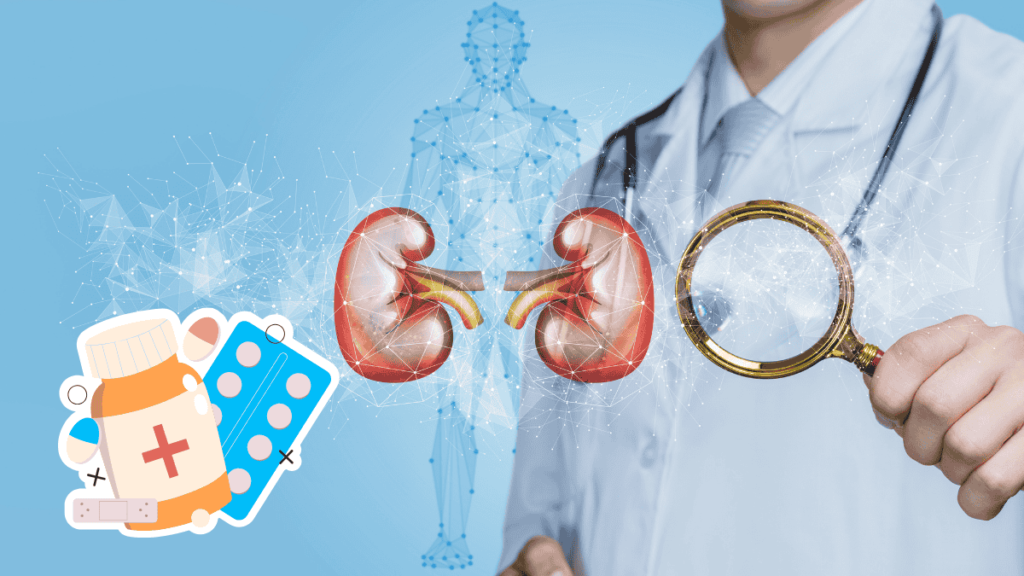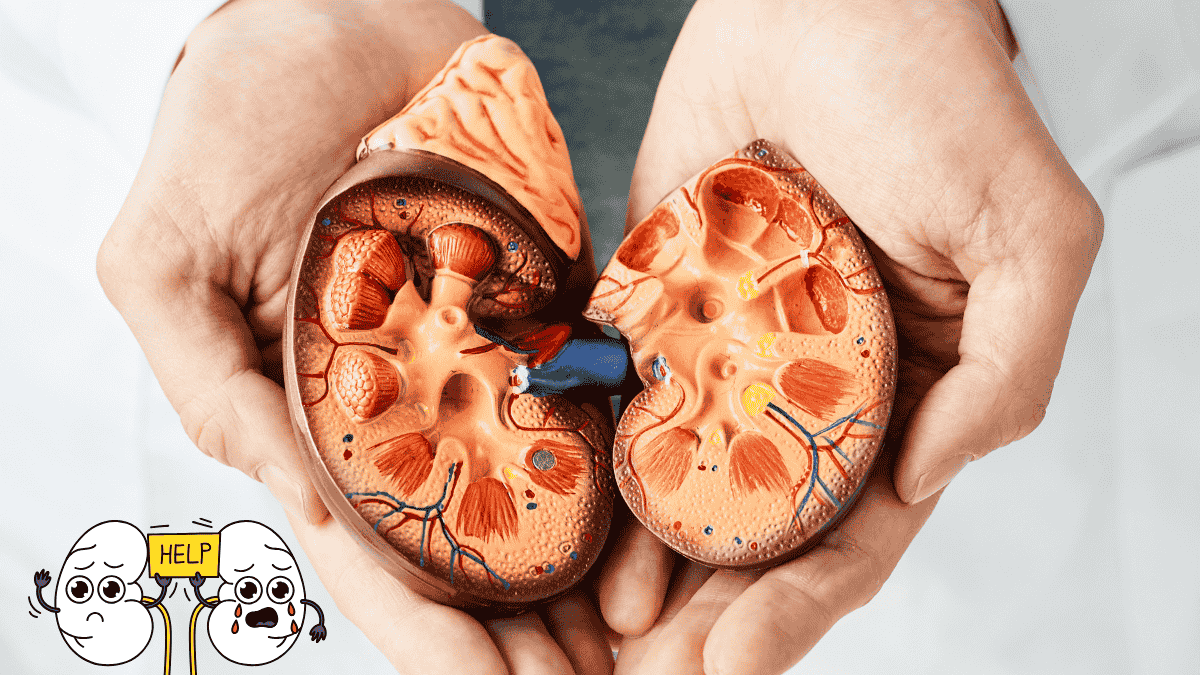What is Kidney Disease?
Definition and Overview
Kidney disease refers to the gradual loss of kidney function, which is essential for filtering waste and excess fluids from the blood. When the kidneys become damaged, they struggle to perform their critical roles, leading to the accumulation of toxins in the body.
This condition can manifest as chronic kidney disease (CKD), developing over many years, or as acute kidney injury (AKI), which occurs suddenly due to factors such as injury or illness. Early detection and management are crucial for slowing disease progression and maintaining overall health.
Types of Kidney Disease
There are several types of kidney disease. Chronic kidney disease (CKD) is a long-term condition characterized by a gradual decline in kidney function, often resulting from diabetes or hypertension.
In contrast, acute kidney injury (AKI) is marked by a sudden decrease in kidney function, typically caused by severe dehydration, medications, or trauma. Polycystic kidney disease (PKD) is a genetic disorder in which cysts form in the kidneys, progressively affecting their function.
Glomerulonephritis involves inflammation of the kidney’s filtering units and can arise from infections or autoimmune diseases. Diabetic nephropathy refers to kidney damage due to diabetes, and hypertensive nephropathy results from high blood pressure. Understanding these types is essential for recognizing symptoms, seeking timely treatment, and effectively managing kidney health.
Symptoms of Kidney Disease
Early Signs to Watch For
In the early stages of kidney disease, symptoms can be subtle and easily overlooked. Common early signs include fatigue, weakness, and changes in urination patterns, such as increased frequency or foamy urine. Some individuals may also experience mild swelling in the legs, ankles, or feet due to fluid retention.
Other signs might include persistent itching and a decreased appetite. Recognizing these early symptoms is crucial for timely intervention and management.
Advanced Symptoms
As kidney disease progresses, symptoms can become more pronounced and may include significant swelling in various parts of the body, severe fatigue, and persistent nausea or vomiting. Individuals may experience confusion or difficulty concentrating due to the buildup of toxins in the blood.
Additionally, advanced kidney disease can lead to anemia, resulting in pale skin and shortness of breath. It’s essential to seek medical attention if these advanced symptoms arise, as they indicate a more serious decline in kidney function and may require more intensive treatment.
Causes of Kidney Disease
Common Risk Factors
Kidney disease can arise from a variety of common risk factors that contribute to its development. One of the primary causes is chronic conditions such as diabetes and hypertension, both of which can severely damage the kidneys over time.
Diabetes can lead to high blood sugar levels that harm blood vessels in the kidneys, impairing their ability to filter waste. Similarly, high blood pressure can damage the delicate blood vessels in the kidneys, reducing their efficiency.
Other risk factors include obesity, which increases the likelihood of developing diabetes and hypertension, as well as a family history of kidney disease. Lifestyle choices, such as smoking and excessive alcohol consumption, can further increase the risk.
Additionally, certain medications and prolonged use of nonsteroidal anti-inflammatory drugs (NSAIDs) can negatively impact kidney health. Recognizing these risk factors is crucial for prevention and early intervention.
Genetic Factors
Genetic factors also play a significant role in the development of kidney disease. Conditions such as polycystic kidney disease (PKD) are inherited and can lead to the formation of numerous cysts in the kidneys, ultimately impairing their function.
Other genetic disorders, such as Alport syndrome, affect the kidney’s filtering system and can lead to progressive kidney damage.
Family history is a critical indicator, as having relatives with kidney disease can increase an individual’s risk of developing similar issues. Genetic predisposition means that even with a healthy lifestyle, individuals may still be at risk due to their genetic makeup.
Understanding these genetic factors is essential for those with a family history of kidney disease, as it can guide proactive measures for monitoring kidney health and seeking medical advice when necessary.
Diagnosis of Kidney Disease
Tests and Procedures
Diagnosing kidney disease typically involves a series of tests and procedures aimed at assessing kidney function and identifying any underlying issues. The most common initial test is a blood test to measure levels of creatinine, a waste product that indicates how well the kidneys are filtering blood.
A urinalysis may also be conducted to check for the presence of protein, blood, or other abnormalities in the urine. Imaging tests, such as ultrasound or CT scans, can help visualize the kidneys and identify structural problems.
In some cases, a kidney biopsy may be performed, where a small sample of kidney tissue is taken for examination. These tests collectively provide a comprehensive view of kidney health and help guide further treatment.
Importance of Early Detection
Early detection of kidney disease is critical for effective management and can significantly slow disease progression. When kidney disease is identified in its early stages, there are more options available for treatment, and lifestyle changes can be implemented to preserve kidney function.
Regular screenings are particularly important for individuals with risk factors such as diabetes, hypertension, or a family history of kidney disease. By catching the disease early, patients can work closely with healthcare providers to develop a personalized management plan that may include dietary adjustments, medication, and regular monitoring to help maintain overall kidney health.
Treatment Options for Kidney Disease
Lifestyle Changes
Making lifestyle changes is one of the most effective ways to manage kidney disease and slow its progression. Patients are often advised to adopt a balanced diet low in sodium, saturated fats, and processed foods while increasing the intake of fruits, vegetables, and whole grains.
Staying hydrated is also crucial, but fluid intake may need to be monitored based on kidney function. Regular physical activity can help maintain a healthy weight and improve overall health. Additionally, quitting smoking and limiting alcohol consumption are important steps in reducing the risk of further kidney damage.
Medications

Medications play a vital role in managing kidney disease and its associated conditions. For individuals with high blood pressure, antihypertensive medications may be prescribed to protect kidney function. Patients with diabetes may require medications to control blood sugar levels, which is essential for preventing further kidney damage.
Additionally, medications that lower cholesterol levels or address anemia may also be part of the treatment plan. It’s important for patients to work closely with their healthcare providers to find the right medications and dosages that suit their individual needs.
Dialysis and Transplantation
In advanced stages of kidney disease, when the kidneys can no longer function adequately, more intensive treatments such as dialysis or kidney transplantation may be necessary. Dialysis is a procedure that artificially removes waste products and excess fluids from the blood when the kidneys cannot do so.
There are two main types of dialysis: hemodialysis, which filters blood through a machine, and peritoneal dialysis, which uses the lining of the abdomen to filter blood inside the body. Kidney transplantation is another option for eligible patients, involving the surgical placement of a healthy kidney from a donor.
This option can restore kidney function and significantly improve quality of life, but it requires careful consideration and management of immunosuppressive medications to prevent rejection.
Managing Kidney Health
Diet and Nutrition Tips
Managing kidney health starts with a well-balanced diet tailored to support kidney function. It’s essential to limit sodium intake to help control blood pressure and reduce fluid retention. Patients are often encouraged to focus on whole foods, such as fresh fruits and vegetables, whole grains, and lean proteins.
Foods rich in potassium and phosphorus may need to be limited, especially in advanced stages of kidney disease, as the kidneys may struggle to maintain appropriate levels of these minerals in the blood. Staying hydrated is crucial, but fluid intake might need to be adjusted based on individual kidney function.
Consulting with a registered dietitian who specializes in kidney health can provide personalized guidance and meal planning to meet specific dietary needs.
Regular Monitoring and Check-Ups
Regular monitoring and check-ups are vital for maintaining kidney health and preventing disease progression. Routine blood tests can help track kidney function by measuring levels of creatinine and electrolytes, while urinalysis can detect early signs of kidney damage.
For individuals with risk factors like diabetes or high blood pressure, more frequent monitoring may be necessary. Additionally, keeping up with doctor appointments allows healthcare providers to adjust treatment plans as needed and address any emerging health concerns.
Patients should also be proactive in discussing any new symptoms or changes in health, ensuring a comprehensive approach to managing their kidney health. By staying vigilant and engaged in their care, individuals can significantly improve their quality of life and kidney outcomes.
Conclusion
In conclusion, managing kidney disease is a multifaceted approach that involves understanding its causes, recognizing symptoms, and adhering to effective treatment options. Early detection through regular monitoring is essential for preserving kidney function and improving overall health.
Adopting a kidney-friendly diet, making necessary lifestyle changes, and working closely with healthcare providers can greatly enhance the quality of life for those affected. Whether through medication, dialysis, or transplantation, there are various strategies available to manage kidney health effectively.
By prioritizing kidney care and staying informed, individuals can take proactive steps toward maintaining their well-being and reducing the impact of kidney disease on their lives.
(FAQs)
What is kidney disease?
Kidney disease refers to the gradual loss of kidney function, impacting waste filtration and fluid balance.
What are the common symptoms of kidney disease?
Common symptoms include fatigue, changes in urination, swelling, and nausea.
How is kidney disease diagnosed?
Diagnosis typically involves blood tests, urinalysis, and imaging studies.
What lifestyle changes can help manage kidney disease?
Adopting a balanced diet, staying hydrated, and exercising regularly can support kidney health.
What medications are used for kidney disease?
Medications may include those to control blood pressure, manage diabetes, and treat anemia.
When is dialysis necessary?
Dialysis is needed when kidneys can no longer filter waste effectively, often in advanced stages of kidney disease.
What is a kidney transplant?
A kidney transplant involves replacing a diseased kidney with a healthy one from a donor.



